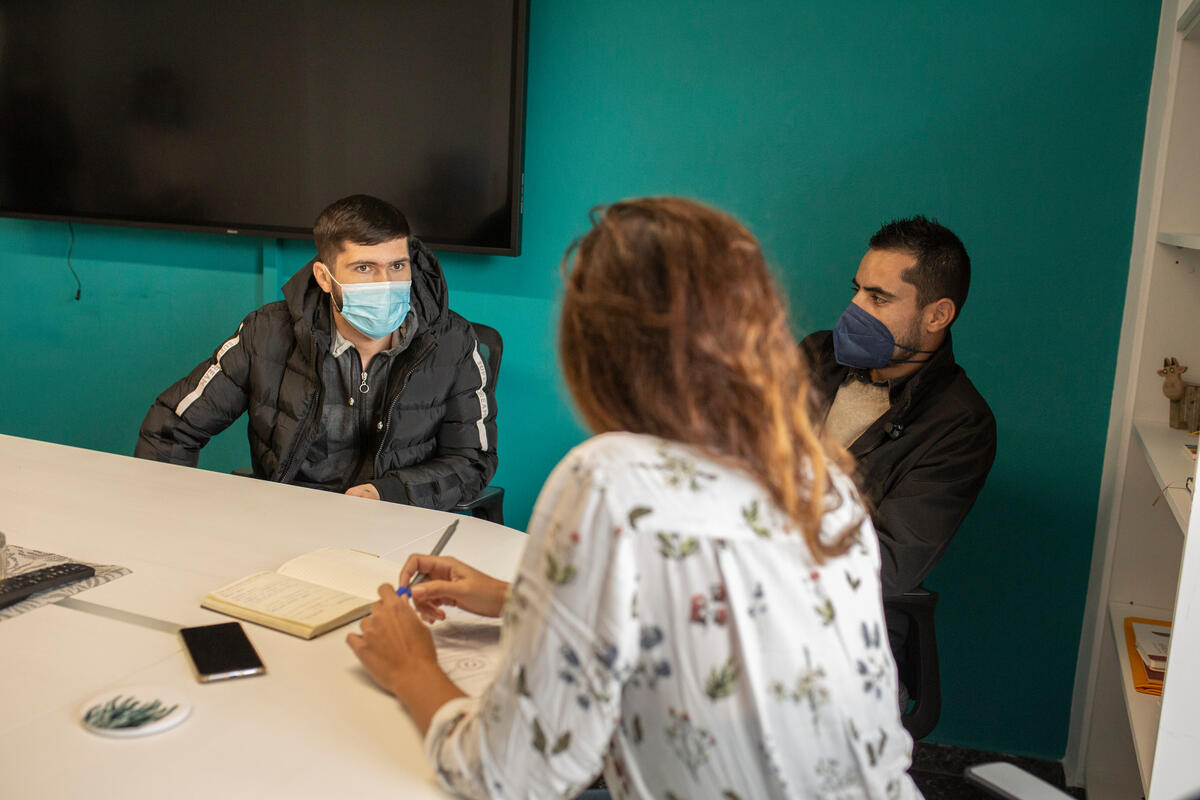Twenty-year-old Nidal on the quayside at Heraklion, on the Greek island of Crete. © UNHCR/Socrates Baltagiannis
Twenty-year-old Nidal shares a very strong emotional bond with his parents. They have been his comfort throughout the family’s perilous journey, from the moment they fled war in their home country, Syria, until they arrived in Greece in 2019.
Soon after he reached adulthood, Nidal left Syria along with his three siblings and their parents, on 27 October 2019. They arrived on Chios island about two weeks later, on 8 November. These are the only two dates he clearly remembers, as the traumatic events he experienced have left deep scars– both physically and psychologically.
Their journey through Turkey was particularly difficult and dangerous. “Everything happens at night. In addition, you don’t know where you are going. We were terrified throughout the journey. We had no idea of what would happen to us. We were hiding and sleeping under bridges”, Nidal recalls.
They were held by traffickers in a locked apartment which they were forbidden to leave until their departure to Greece. Despite the circumstances, the presence of his parents throughout eased his fears.
They reached Chios island by boat at night. Once they arrived at the Reception and Identification Centre, Nidal and his family had to endure very difficult living conditions. But being all together gave them the strength to pull through.
However, Nidal’s parents and siblings were transferred to Crete island as part of the Government’s efforts to decongest the overcrowded sites on the islands and protect the most vulnerable against COVID-19. There, the family was accommodated in an apartment run by the Emergency Support to Integration and Accommodation (ESTIA) programme, implemented with financial support from the European Union, until they were granted asylum.
But Nidal had to stay behind on Chios island, as he had been registered separately as an individual adult and not as part of his family, so he had to wait for his individual asylum application to be assessed before he could leave the island. That was the first time he found himself alone, in a new country.
Nidal’s application and that of his family were assessed under different asylum procedures. As a result, despite fleeing the same dangers back home, his family received asylum in Greece while initially, Nidal did not. Separation from his family took a toll on both his psychological and physical condition. He developed an autoimmune skin disease, which deteriorated when he finally received the rejection decision of his asylum claim.
“It was the strongest blow. I tried to sleep at night so as not to think, but I couldn’t. I had no desire for food or life. I was afraid of being sent back to Turkey”, he explains.
As soon as Nidal received the decision to deport him, he was allowed to leave Chios and traveled to Crete to meet his family, who were already taking their first steps towards integrating into the local community.
He hadn’t seen his family for three months. “As soon as I saw my parents, I felt relieved”, he recalls. While on Crete, the Heraklion Development Agency – which was supporting his family through the ESTIA programme, notified UNHCR’s legal aid partner Greek Council for Refugees (GCR) about Nidal’s unusual case. In turn, GCR provided him with legal support to submit a subsequent asylum application.

Nidal meets with Katerina Drakopoulou, a lawyer with the Greek Council for Refugees, at the Heraklion Development Agency’s offices on Crete. ©UNHCR/Socrates Baltagiannis
While the chances of having a subsequent application accepted were slim, his application was eventually considered, thanks to the valuable legal aid he received from Katerina Drakopoulou, his lawyer from GCR.
GCR’s legal interventions effectively established that it would be unsafe to return Nidal, while the lawyer also underlined both the positive asylum decision for his family and his dependence on his parents. In the end, his asylum application was re-examined, and eventually he received international protection and refugee status in November 2021.
The contribution of ESTIA social workers played a key role throughout the various stages of this process.
“We had to submit a medical certificate proving his disease and since Nidal didn’t have a provisional insurance and health care number to book an appointment in a public hospital, we managed to find and refer him to a private doctor. We got the certificate, and everything went well”, Garyfallia Manelaki, social worker at the ESTIA programme of the Heraklion Development Agency, recalls.
Litsa Giakoumaki is head of the social service of the Heraklion Development Agency’s ESTIA programme. She emphasized that the excellent cooperation between the city’s institutions led to an integrated network of services to support Nidal and his family.
“Despite how simple it looks, the procedures were many and complex. Nonetheless, thanks to the coordination of the actions needed, this man managed to reunite with his family”, she says.
Thanks to UNHCR’s legal aid programme, implemented with the financial support of the European Union, asylum-seekers and refugees in Greece can access free legal assistance during their asylum process and to navigate the complex legal and often-changing bureaucratic procedures.

Nidal on the quayside of the Heraklion city on Crete can now look ahead with optimism. ©UNHCR/Socrates Baltagiannis
Following the positive decision on his asylum application, Nidal’s psychological state improved, and he now looks ahead with optimism. He and his family are now recognized refugees who can make plans for their future. His skin disease is in remission, and he is beginning to become independent. His dream is to become a car mechanic.
Nidal is grateful for all the help and support he received throughout this difficult period. Whenever he meets with his GCR lawyer, he always expresses his wholehearted thanks, emphasizing that if not for her he wouldn’t be where he is today.
“I got a lot of psychological support. I owe the positive asylum decision to Katerina”, he says with gratitude.
Share on Facebook Share on Twitter